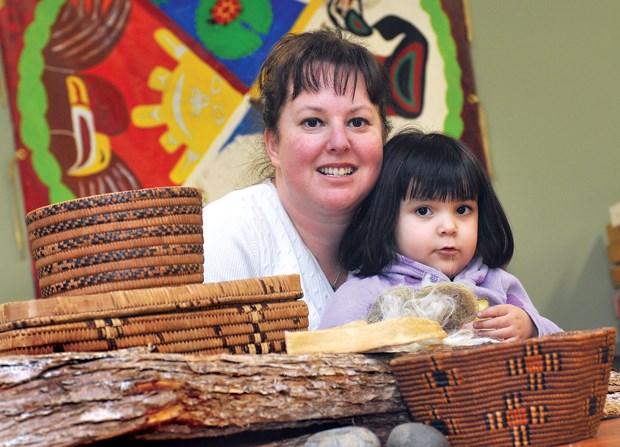Squamish Nation member Tracy Williams (Sesemiya) comes from a long line of weavers.
"My grandma was a weaver and she learned how to weave from her grandmother by coal oil lamp," she says. "My grandmother passed away when I was quite young so I didn't have an opportunity to learn from her, but I've inherited the love for cedar weaving from her, absolutely."
Williams has practised the traditional First Nations art of cedar bark weaving for 18 years, creating baskets, clothing, hats and adornments. Always eager to share her knowledge with others, she does demonstrations and teaches classes fairly regularly. Her next hands-on workshop is set for Jan. 18 at Lynn Canyon Ecology Centre where participants will learn how to weave bracelets using strips of red cedar bark that Williams collected in the forest.
"You have to gather in the springtime when the sap is flowing through the tree," she says, explaining it is important to always ask permission before taking any material from a tree. "We say a prayer and try to show great respect for the tree."
Trees that have been altered by aboriginal people for traditional use are known in B.C. as Culturally Modified Trees.
"You have to find a tree that's fairly tall, that's straight, that has high branches, that's probably about 75 years old, and then you can take no more than two hand-widths of the tree bark from the tree," Williams explains. "It will heal, but it will be scarred for the rest of its life."
Once the bark is collected, it is set aside to dry for up to one year.
"What it does is it allows the water content to come out of the tree bark and the sap to come out," Williams says. If she were to start a project with freshly harvested bark, it would shrink.
Williams will introduce workshop participants to several basic weaving patterns, such as the checkerboard and the twill weave.
"There will be different options for people, just depending on how comfortable they are," she says. "We'll talk about different patterns and styles, techniques. We'll also talk a little bit about natural dyes as well and how they can be used in your patterns."
Participants will be able to view samples of larger and more complex items that demonstrate a variety of traditional First Nations weaving techniques.
"For example, we'll have baskets that are made out of cedar roots, and those are important because they're able to be made so that they're waterproof so you can carry water and so you can cook in them."
Also on display will be a clam basket, which features cedar tree branches in an open weave allowing water to drain through the vessel. In addition to baskets, Williams will bring along some water-repellent woven cedar clothing to demonstrate how the texture of tree bark changes after a long softening process.
Williams, who works with the Squamish Nation Education Department, also has a keen interest in mountain goat wool and ancient spinning and dying techniques. It's important to pass traditional skills, such as weaving, on to the younger generation, she says, and her own children accompany her when she gathers supplies.
"They understand how to be in the forest, how to enjoy being outside, how to understand the different gifts that various plants have - whether that be as a dye, as a wild fibre, as cordage or a food source."
And weaving is not just an important tradition of local First Nations people, she says; it's a craft with a long and storied history in many countries around the world.
"Everybody, at some point in their culture, in their history, had weavers in their family," she says. "I think it's important to share and to remember and to honour all those pieces of who we are as human beings."
In her workshops and classes, she strives to help people connect with nature and gain a better understanding of natural materials.
"I think it's so important for people to take time to learn more about their surroundings - not just to learn it, but to feel it, to touch it, to be a part of our natural environment."
Join Williams to weave a cedar bracelet on Sunday, Jan. 18, 1-2:30 p.m. at Lynn Canyon Ecology Centre, 3663 Park Rd., North Vancouver. Cost: $8.25. Pre-register by calling 604-990-3755.



